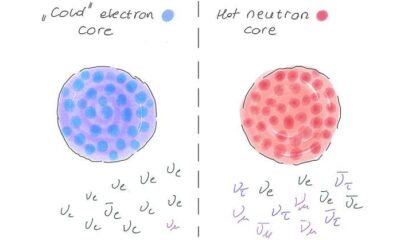Science
Researchers Unveil Quantum Version of Bayes’ Rule in Major Breakthrough

An international team of researchers has made a significant advancement in the field of quantum physics by deriving a quantum version of Bayes’ rule. This fundamental discovery, published on August 28, 2025, in the journal Physical Review Letters, explores how beliefs are updated in quantum systems, where traditional laws of physics do not apply.
The research was led by Professor Valerio Scarani from the Centre for Quantum Technologies at the National University of Singapore, along with Assistant Professor Ge Bai from the Hong Kong University of Science and Technology, and Professor Francesco Buscemi from Nagoya University in Japan.
Understanding Bayes’ Rule
Bayes’ rule, formulated in the 18th century by mathematician Thomas Bayes, is a method for updating the probability of a hypothesis based on new evidence. This principle has applications across various fields, including medical diagnosis, weather forecasting, data science, and machine learning.
In essence, Bayes’ rule allows individuals to revise their expectations when new information emerges. For instance, if a person suspects they have the flu and later receives a positive test result, Bayes’ rule quantitatively increases the likelihood that they are indeed ill. The rule operates on the concept of conditional probability, adjusting prior beliefs to form a new, informed belief, known as the posterior.
Bayes’ Rule in the Quantum Realm
While classical Bayes’ rule is well-established, its quantum counterpart has posed challenges. Quantum systems behave distinctly from classical systems, governed by probabilities and wavefunctions that define the likelihood of a particle’s state. Previous attempts to develop a quantum version of Bayes’ rule lacked a foundation in fundamental quantum mechanics.
The research team approached this challenge by focusing on how beliefs should evolve in response to new quantum measurements, aiming to maintain a close connection to the principle of minimum change. This principle suggests that beliefs should only be adjusted minimally when incorporating new information.
Mathematically, this is represented by minimizing the distance between the original and updated probability distributions. To adapt this concept to the quantum domain, the team utilized a concept called quantum fidelity, which assesses the closeness of two quantum states. Their objective was to maximize fidelity, meaning they sought the least alteration in belief necessary to accommodate the observed data.
The team succeeded in deriving a quantum version of Bayes’ rule by maximizing fidelity between two mathematical constructs that represent the forward and reverse processes of measurement and belief update.
They also discovered that their equations aligned with the Petz recovery map, a well-known tool in quantum information theory. Introduced in the 1980s, the Petz map was previously considered a potential quantum analogue of Bayes’ rule due to its valuable properties. However, it had never been derived from first principles until now.
This breakthrough not only affirms the relevance of the Petz map in quantum reasoning but also opens avenues for new applications, including quantum error correction and quantum machine learning.
The researchers are now investigating whether the principle of minimum change can yield further quantum analogues by applying it to various mathematical measures. Their findings have the potential to narrow the gap between classical and quantum reasoning, laying a foundation for future quantum technologies.
This research marks a pivotal moment in quantum physics, offering insights that could transform how we understand and apply probability in the quantum domain.
-

 World6 days ago
World6 days agoCoronation Street’s Shocking Murder Twist Reveals Family Secrets
-

 Entertainment4 months ago
Entertainment4 months agoKate Garraway Sells £2 Million Home Amid Financial Struggles
-

 Entertainment3 months ago
Entertainment3 months agoAnn Ming Reflects on ITV’s ‘I Fought the Law’ Drama
-

 Entertainment3 days ago
Entertainment3 days agoAndrew Pierce Confirms Departure from ITV’s Good Morning Britain
-

 Health3 months ago
Health3 months agoKatie Price Faces New Health Concerns After Cancer Symptoms Resurface
-

 Entertainment4 weeks ago
Entertainment4 weeks agoCoronation Street Fans React as Todd Faces Heartbreaking Choice
-

 World4 weeks ago
World4 weeks agoBailey Announces Heartbreaking Split from Rebecca After Reunion
-

 Entertainment1 week ago
Entertainment1 week agoTwo Stars Evicted from I’m A Celebrity Just Days Before Finale
-

 World1 week ago
World1 week agoKevin Sinfield Exceeds Fundraising Goal Ahead of Final Marathons
-

 Entertainment3 months ago
Entertainment3 months agoCoronation Street’s Carl Webster Faces Trouble with New Affairs
-

 Entertainment3 months ago
Entertainment3 months agoWhere is Tinder Swindler Simon Leviev? Latest Updates Revealed
-

 Entertainment4 months ago
Entertainment4 months agoMarkiplier Addresses AI Controversy During Livestream Response















